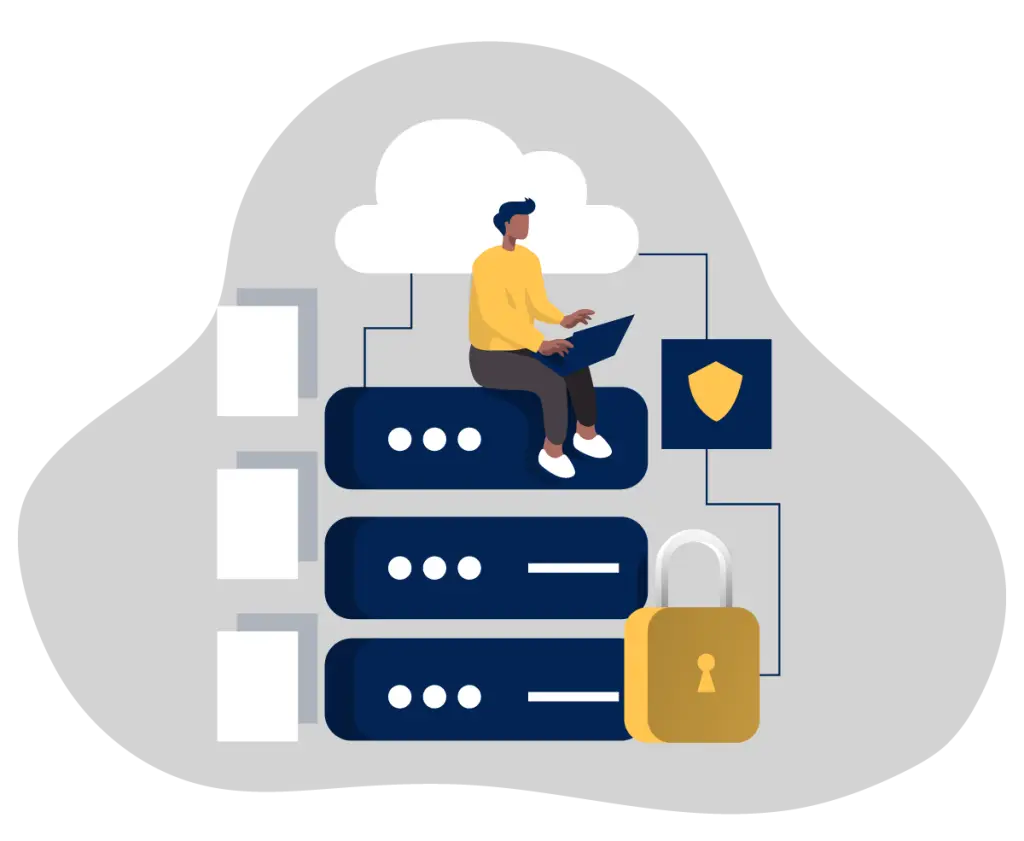In conversation with Jaclyn Parent
As our Cyber Management Essentials course attracts the first cohort of future Canadian cybersecurity leaders, who better to speak with than Jaclyn Parent? As a master of mindset, she has found the formula for transitioning from the role of a technical expert to a strategic and growth-oriented leader. We caught up with her to learn about her role as Manager, Cyber Vulnerability at Metrolinx, where she’s built a reputation as an effective, intuitive, empathetic, and results-driven leader.
Jaclyn is a model and champion of translating the technical and complex into accessible language and concepts. She developed her strengths as a cybersecurity professional in the Catalyst’s ACTP program She embodies the core principles of Cyber Management Essentials. As the Catalyst has supported Jaclyn’s growth, she was eager to talk about how it might support others.
Strategies for success at the start of your career
When you ask her about her greatest strength, Jaclyn doesn’t hesitate. She’s skilled at breaking down the complex into clear, actionable insight. It’s clear in her writing, speaking, and thinking that this is ingrained and she’s disciplined about it. Jaclyn had to use this skill under pressure when she was fresh out of grad school and starting her career as a twenty-something. At the time, she was asked to facilitate a meeting of senior technical architects. Instead of succumbing to the fear that might grip a young 20-year old trying to make an impression, Jaclyn leaned into a solid strategy and was sure of her strengths. “The goal was to define an architectural pattern for a solution, and I was clearly in over my head, technically. But I leaned on a few strategies that helped me succeed,” says Jaclyn.
She came into the meeting and took up space at the front of the room like a pro. She had a framework for success: confidence, transparency, and active listening. From the outset, Jaclyn acknowledged that the technical depth was out of her scope, and this is where transparency came into play. She knew that honesty and lack of ego were key to guiding the conversation and achieving the group objective, so up front, she told the group that she would have to lean on them, that she was not as technically advanced. In this way, she called in the other members of the group to participate, educate, offer insights, and shape the solution. There was another key ingredient. Jaclyn prioritized active listening. She repeated back what she understood, asked clarifying questions, and drew on a whiteboard to confirm alignment. By the end of the meeting, the group had successfully defined the architectural pattern. Jaclyn followed up with detailed notes and diagrams and asked the team to review them, ensuring everything was captured accurately.
Tips on stepping into leadership
According to Jaclyn, it’s not about knowing everything. Her experience in that first meeting cemented her belief that strong collaboration and great results come from clarity.
It’s perfectly acceptable to say, “I don’t understand,” as long as it’s followed by, “Help me understand.”
Many people in the room may feel the same, but don’t feel confident enough to speak up.
In the field, Jaclyn’s initial instincts about minimizing complexity have proven true. As a manager, translating technical information into clear, accessible language was a core responsibility, but it’s one which many managers overlook. Jaclyn puts plain language to work showing her team that complexity isn’t always necessary and in fact, simplicity is often more effective. “Clear, concise communication helps everyone stay aligned and focused,” she says. “Less really is more.”
In a technical field like cybersecurity, clear communication is the baseline of strong connection and collaboration. According to Jaclyn, it’s one of the most essential – and often underestimated – skills for a successful cybersecurity team. This is especially true of cyber defence, where Jaclyn says, “our ability to respond to critical vulnerabilities hinges on how quickly and accurately information is shared.” Jaclyn promotes solid communication by fostering open dialogue to ensure alignment and swift action. A key learning in her role has been that it’s essential that managers effectively communicate to senior leadership. This means tailoring detail and complexity to match an audience and given that leadership is short on time, it means conveying issues clearly to build trust and drive informed decision making. She may not have all the answers all the time, but she’s skilled at asking the right questions and presenting possible solutions.
“I Wish I Had This Sooner”: What One Cyber Leader Sees in Cyber Management Essentials
Leadership involved a big learning curve which is why Jaclyn’s so passionate about Cyber Management Essentials. As a new manager, she had to shift her mindset. She had spent 10 years in an analyst role where understanding technical details and resolution was critical. But management required an entirely different skillset.
In a management role, I quickly realized I couldn’t stay in the weeds.
The role demanded that her focus shift to overseeing the broader portfolio and setting the strategic direction. Always agile and focused, she assessed what was needed for success and took the next steps. She built confidence and trust in her team to handle the technical execution.
When she looks back, Jaclyn says the leadership growth spurt happened in the space between the roles of technical do-er and problem-solver. She can only imagine how much simpler it would have been, if she’d had the support of the program. Instead, she learned on the fly and guided herself, which came with more aches and pains. Jaclyn says she had to tap into some of the soft skills which would empower her team to their fullest potential: guiding, supporting, and coaching. In addition, her focus became strategic thinking. She was no longer in the weeds, but instead managing interactions with stakeholders, and the dynamics of the team. Out of this growth spurt, Jaclyn took away a key learning: leadership is about creating the conditions and environment for a team to thrive. Not only does a team need to thrive and feel supported, however, so too does the leader.
As she navigated new skills and goals, Jaclyn leaned into community. She meets weekly with a team of cybersecurity managers to collaborate, share ideas, and provide mutual support. Jaclyn says of these sessions, “They offer a valuable forum for discussing challenges, refining strategies, and identifying the right contacts for specific issues.” This invaluable community has shaped solutions and guided next steps through collective insight and experience. But despite having found her footing, Jaclyn advocates for others to find it sooner and with greater ease.
What Makes a Great Cyber Leader? Jaclyn’s Take
Jaclyn’s role positions her to support and recognize the growth of her team.
I know a team member is ready to move into a management role when I see them taking on greater responsibility, making decisions independently, and thinking as a leader.
Jaclyn’s experience has taught her that effective managers don’t wait to be assigned tasks. She says, “They proactively plan, look for opportunities to improve processes, and align their work with the strategic direction of the team.” When a contributor shows initiative and a broader perspective, Jaclyn knows they are ready to take the next step into leadership.
A strong believer in a technical baseline, Jaclyn says, “In my experience, some of the most effective leaders are those who have transitioned from hands-on roles, such as analysts, into management positions.” The benefit of understanding how things function from a technical perspective is that, according to Jaclyn, “Individuals bring a deep understanding of the work, the stakeholders, and practical approaches to problem-solving.” This inside perspective puts a leader in a position to guide and support junior staff with credibility and insight.
Jaclyn’s stubborn learning curve was delegation. “It wasn’t until my workload became overwhelming,” she says, “that I realized the importance of intentionally delegating tasks and shifting my focus toward oversight and strategic leadership.” Delegation opened up new strategic opportunities and Jaclyn says, “Learning to let go and trust others was a key step in my growth as a manager.”
What is excellent cyber management?
Jaclyn’s experience highlights that cyber management is more nuanced than many other forms of management because it requires technical insight, including striking the right balance between risk, compliance, and operational functionality. Jaclyn says, “As a vulnerability management leader, I focus on staying ahead of the evolving threat landscape by combining automation with hands-on analysis, implementing solutions and fixes to ensure we are meeting our security objectives while supporting the broader goals of the organization’s cybersecurity strategy.” Although, the transition from a technical to a management role requires a shift in mindset from do-er to strategist, excellent cyber management merges the best of both worlds.
What attracts many leaders, Jaclyn included, is that cybersecurity is a dynamic and constantly evolving field. Jaclyn loves being a cyber manager because as she says, “with new threats, tactics, and techniques emerging regularly, there’s always something to learn.” As someone who consistently aims to empower her team, Jaclyn takes pride in witnessing their growth. One of her favourite parts of leading, she says, is the experience of, “seeing team members develop new skills, gain confidence, and truly thrive in their roles. Jaclyn knows that by pursuing and supporting the growth of her team members, she’s advancing the field.
Watching my team adapt, stay curious, and strengthen their capabilities in this dynamic field is incredibly rewarding and a highlight of my role as a leader.
Cyber Management Essentials: The missing piece
As Jaclyn says, “To lead a successful cybersecurity team, it’s essential to shift from being a hands-on contributor to taking a role of leadership and oversight.” As Jaclyn learned more about the Cyber Management Essentials Program, she was impressed that it provides practical training. Jaclyn’s experiences and thoughtful insights are reflected in the program which aims to transition professionals from technical roles to strategic leadership. Jaclyn sees it as the piece she was missing; through expert instruction, career coaching, and a strong peer network, the program helps individuals build core management skills, sharpen business acumen, and lead with confidence.
The program is designed to equip you with the critical skills needed to manage effectively–ranging from handling HR matters and thinking strategically to guiding and developing your team.
When Jaclyn reflects on her own transition, she says, “These are the foundational skills that will help you take the next step in your cybersecurity career.” If you’re ready to step into leadership like Jaclyn did, Cyber Management Essentials could be your next step.







